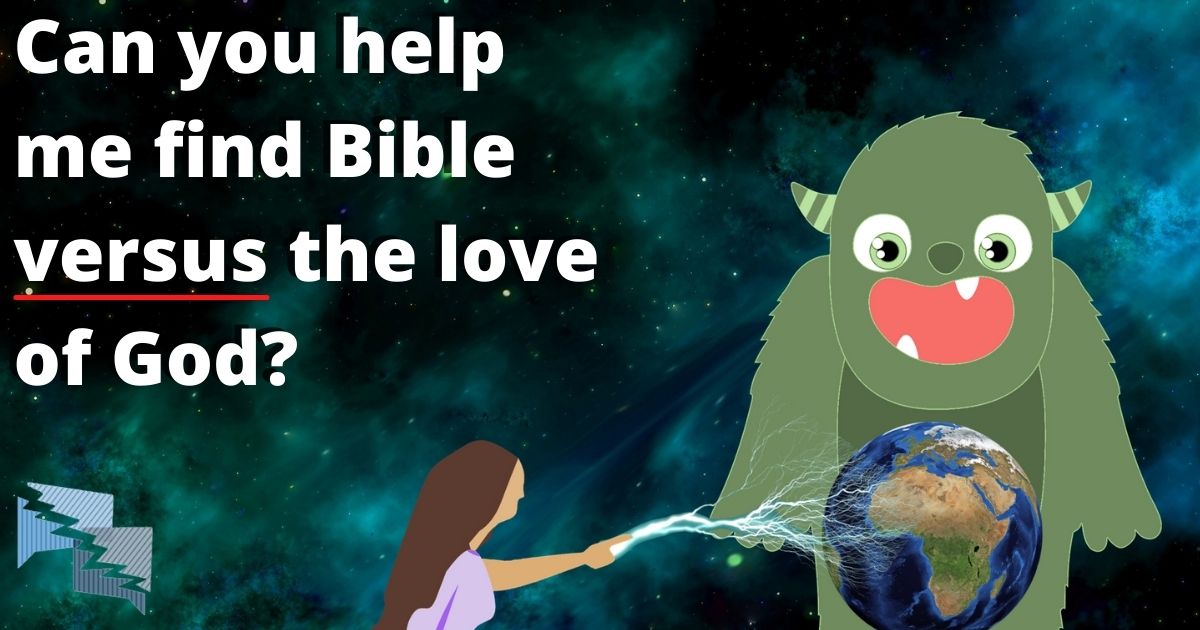
Can you help me find Bible versus the love of God?
So, as you know, Christianity grew up in the midst of the Roman Empire which was still strongly influenced by the philosophy of the Greeks. Bible writers actually used Greek philosophy to explain important theological concepts—Jesus as the logos (John 1:1) is one example. Another is Paul's whole speech before the Stoics and Epicureans in Athens (Acts 17:22-31). But Greek philosophy should only be used by a professional in a controlled environment, with, like, firefighters on standby, which didn't always happen.
Enter the Gnostics. See, Greek/Platonic philosophy teaches that everything that's physical is bad and everything that's spiritual is good. It teaches there is this great spiritual being that is the source of all, by turns called Parent or Bythos or Monad. It made a bunch of Aeons—other spiritual beings—including Sophia, the embodiment of knowledge and wisdom. Sophia tried to do a thing and accidentally created physical matter (I hate it when that happens!) as well as the Demiurge, aka: "Son of Chaos," which wasn't actually very wise. While Sophia was getting a latte and thinking about her life choices, the Demiurge created our world. When Sophia found out, she fired the nanny and barely managed to give a divine spark to some of the humans in hopes that they could eventually shed their physical form and return to the Parent…spiritual…source…thing. The Parent sent Christ to bring Sophia back and to bring humans the knowledge, or gnosis, they needed to escape the physical world and the nasty physical bodies made by the Demiurge.
Fast forward to the days of the early church. People who grew up immersed in Greek philosophy are suddenly immersed in stories about Jesus, the Holy Spirit, Father God, sacrifice, salvation, and eternal life in heaven. Then they hear about the Old Testament—the God who sent the Israelites out to slaughter the Canaanites. They figure, Hey! John and Paul combined Gnosticism with Christianity…let's see how far we can take it! Unfortunately, they were not professionals and they did not experiment in a controlled environment.
Instead, they shed the OSHA laws of critical thought and aimed the cannonball of philosophy into the wall of the nearest house. And a minivan. They decided that the love that Jesus shows in the New Testament is incompatible with the violence of the God of the Old Testament. They can't be the same Being. The OT God must be the Demiurge who created the world. What this means theologically is that the God of the Jewish Bible is inconsistent with the love of the God of Christianity.
It doesn't help that, as with all ancient stories, everyone has their own interpretation of Sophia and the Demiurge. Additions to the soup include Archons, the Ogdoad, the Pleroma, the Upper Pleroma, and who knows what else. This is the Gnosticism that the Bible writers fought when they insisted on a physical resurrection of believers from the dead. This is the source of heretical beliefs that teach Jesus can't be fully God and fully man, like Docetism, which says Jesus is a hologram, as well as all the different versions of "Jesus was a man whom Father God adopted." It's also the source of the Gnostic gospels, which are utter rubbish. (Get it? Because they were found in an ancient Egyptian garbage dump?)
Anyway. Yes, the stories of God commanding the destruction of the Canaanites are disturbing, but we don't have to look for answers in a Demiurge, created by the Aeon Sophia, who also wanted a craft day and wound up just making a mess. God is the God of eternity, the Old Testament, the New Testament, the church, and forever forward, and there are plenty of Bible verses that talk about His love.
Enter the Gnostics. See, Greek/Platonic philosophy teaches that everything that's physical is bad and everything that's spiritual is good. It teaches there is this great spiritual being that is the source of all, by turns called Parent or Bythos or Monad. It made a bunch of Aeons—other spiritual beings—including Sophia, the embodiment of knowledge and wisdom. Sophia tried to do a thing and accidentally created physical matter (I hate it when that happens!) as well as the Demiurge, aka: "Son of Chaos," which wasn't actually very wise. While Sophia was getting a latte and thinking about her life choices, the Demiurge created our world. When Sophia found out, she fired the nanny and barely managed to give a divine spark to some of the humans in hopes that they could eventually shed their physical form and return to the Parent…spiritual…source…thing. The Parent sent Christ to bring Sophia back and to bring humans the knowledge, or gnosis, they needed to escape the physical world and the nasty physical bodies made by the Demiurge.
Fast forward to the days of the early church. People who grew up immersed in Greek philosophy are suddenly immersed in stories about Jesus, the Holy Spirit, Father God, sacrifice, salvation, and eternal life in heaven. Then they hear about the Old Testament—the God who sent the Israelites out to slaughter the Canaanites. They figure, Hey! John and Paul combined Gnosticism with Christianity…let's see how far we can take it! Unfortunately, they were not professionals and they did not experiment in a controlled environment.
Instead, they shed the OSHA laws of critical thought and aimed the cannonball of philosophy into the wall of the nearest house. And a minivan. They decided that the love that Jesus shows in the New Testament is incompatible with the violence of the God of the Old Testament. They can't be the same Being. The OT God must be the Demiurge who created the world. What this means theologically is that the God of the Jewish Bible is inconsistent with the love of the God of Christianity.
It doesn't help that, as with all ancient stories, everyone has their own interpretation of Sophia and the Demiurge. Additions to the soup include Archons, the Ogdoad, the Pleroma, the Upper Pleroma, and who knows what else. This is the Gnosticism that the Bible writers fought when they insisted on a physical resurrection of believers from the dead. This is the source of heretical beliefs that teach Jesus can't be fully God and fully man, like Docetism, which says Jesus is a hologram, as well as all the different versions of "Jesus was a man whom Father God adopted." It's also the source of the Gnostic gospels, which are utter rubbish. (Get it? Because they were found in an ancient Egyptian garbage dump?)
Anyway. Yes, the stories of God commanding the destruction of the Canaanites are disturbing, but we don't have to look for answers in a Demiurge, created by the Aeon Sophia, who also wanted a craft day and wound up just making a mess. God is the God of eternity, the Old Testament, the New Testament, the church, and forever forward, and there are plenty of Bible verses that talk about His love.
This is what WOULD happen if GotQuestions.org genuinely, honestly answered all the mis-typed, autocorrected, or otherwise altered "spiritual" questions that come their way every day.
HOME | ABOUT | CATEGORIES | CONTACT | THE REAL SITE
© 2024 Got Questions Ministries. All rights reserved.

